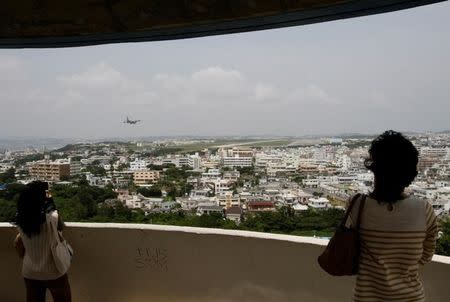U.S. dangles large land return as anti-base resentment surges in Okinawa
By Tim Kelly OKINAWA, Japan (Reuters) - The United States Marine Corps in Okinawa may hand back a 10,000 acre (40.5 square km) tract of land to Japan early next year, its commander said on Saturday, as Washington confronts a surge in opposition to U.S. military bases there following the murder of a Japanese woman. The return of the land, part of a jungle training camp, known as Camp Gonsalves in Northern Okinawa, was agreed in 1996, but has been delayed by protesters blocking the construction of helipads by the Japanese government that the Marines say they need before the handover. "There have been discussions recently and we are hopeful that in the second half of this year there will be some movement," Lieutenant General Lawrence D. Nicholson said at his headquarters at Camp Foster in Okinawa. "It would be the largest land return since 1972." Okinawa, which was under U.S. occupation until 1972, still hosts 30,000 military personnel living and working on bases that cover a fifth of the island. Local resentment about that burden surged after an American civilian working at a U.S. base was arrested last month in connection with the murder of a local 20-year-old Japanese woman. The incident has spurred calls, backed by Okinawa Governor Takeshi Onaga, for the United States to move military personnel off the island. In 1996 the U.S. and Japanese governments agreed to relocate some troops outside Okinawa and move others to less populated parts of the island after the rape of a Japanese schoolgirl by three U.S. servicemen. "They came with guns and bulldozed people's homes to build their bases. We didn't give it to them," said Junsei Shimoji a 76-year-old taxi driver whose family home was destroyed during the U.S. invasion of the island in 1945 at the end of World War Two. Nicholson announced a 30-day mourning period following the murder last month, banning marines from drinking at bars off base. "If you violate Japanese law, you will be subject to it and I think that is an important and strong message that the Okinawan people need to know," he said Troops will be allowed back into public bars from June 25, Nicholson said, although major fourth of July celebrations such as firework displays will be canceled. "We are going to have a subdued fourth of July, and that is on all of Okinawa and probably throughout the whole of Japan," he said. Nicholson said he has ordered all of his troops to stay away from a demonstration on Sunday in Okinawa's capital, Naha, to protest against U.S. bases. The organizers are expecting thousands of people at what could be the biggest such gathering in at least two decades. (Reporting by Tim Kelly; Editing by Richard Pullin)


